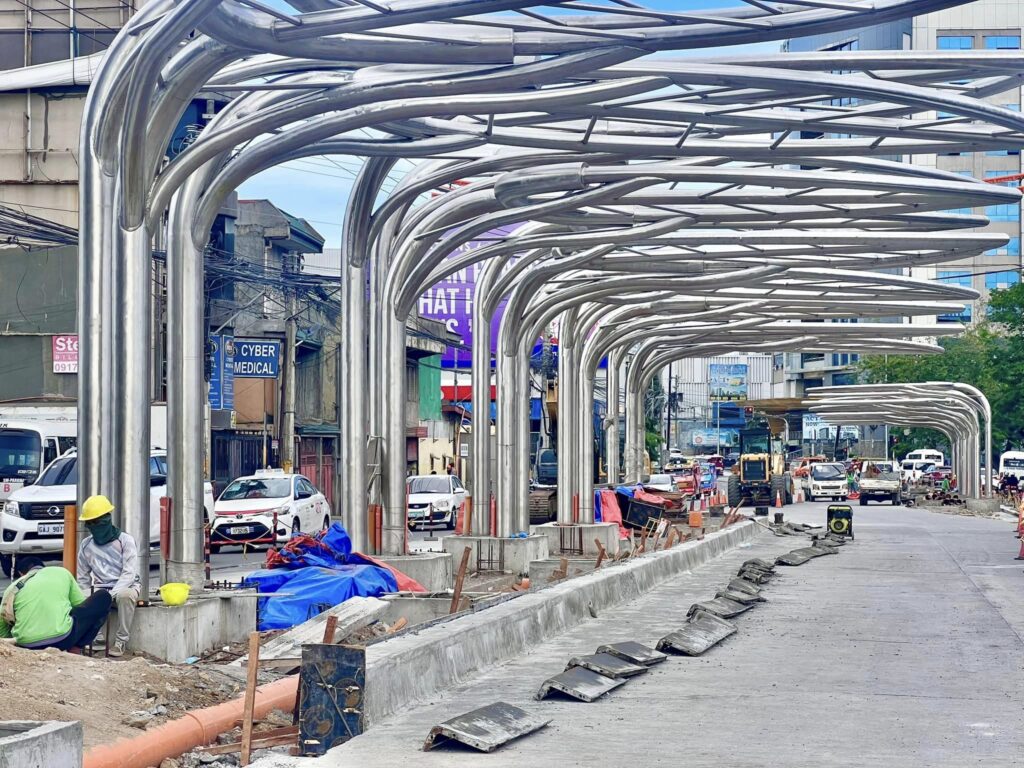
Cebu Bus Rapid Transit along N. Bacalso Avenue as of June 2, 2024. | Photo credits: Cebu Ni Bai
CEBU CITY, Philippines –The Cebu Bus Rapid Transit (CBRT) project has stalled at 69.01 percent completion for Package 1 as of July 5, 2024.
A recent report from the Department of Transportation (DoTr) indicated that while 69.01 percent of the project has been completed, 20 percent is currently affected by a cease and desist order, leaving only 10.90 percent as the workable portion.
Originally, Package 1 of the CBRT was scheduled for completion within 365 days, from December 19, 2022, to December 18, 2023. However, several key components remain unfinished.
Seventy percent of the pipes and culverts have been installed, and although 100 percent of the stainless roof leaf-frames have been delivered, only 50 percent have been installed.
The Cebu Normal University (CNU) and Cebu South Bus Terminal (CSBT) stations are fully equipped, but the stations at Fuente Osmeña and Capitol remain untouched. Additionally, only 62 percent of the asphalting work has been completed.
These figures, as reported by the DOTR, indicate that while some progress has been made, critical aspects of the project remain in limbo, particularly at the stations near the Capitol area.
READ MORE:
What’s the future of Cebu BRT? Phase 1 completion now uncertain
Councilors demand clear plans, transparency in CBRT
CBRT project faces uncertainty amid mismanagement, land disputes
On June 20, Engineer Norvin Imbong, the CBRT’s project evaluation officer, announced an “indefinite” delay in the completion of Package 1. He cited ongoing disputes over heritage protection as a significant factor.
The disputes center around the bus terminal planned for construction in front of the Cebu Provincial Capitol.
During the June 20 update, Imbong suggested that the completion could be pushed to August 2024. However, when pressed on whether the delay might extend “until further notice,” he confirmed.
Buffer zones
The project’s advancement was initially derailed in February 2024 when Cebu Governor Gwendolyn Garcia issued a directive halting civil works near Fuente Osmeña and the Capitol building to protect heritage sites.
In a memorandum dated February 27, 2024, Garcia instructed the CBRT team and its contractor, Hunan Road and Bridge Construction Group Ltd., to stop construction on province-owned lots along Osmeña Boulevard.
The governor cited the need to protect the buffer zones of the Capitol and Fuente Osmeña Circle, which she deemed crucial for heritage preservation.
This directive came shortly after an optimistic report on February 17, 2024, where the project was assessed to be 60 percent complete, with expectations of finishing by July 2024.
However, the governor’s intervention to protect heritage sites effectively halted the progress, particularly affecting 20 percent of the project related to terminal construction near these sensitive areas.
Lack of progress
Meanwhile, Cebu City Councilor James Cuenco, the chairman of the transportation committee, has been outspoken about the ongoing delays and has expressed frustration over the lack of progress.
He criticized the management of the CBRT project, particularly the handling of the heritage disputes, which have contributed to the 20 percent delay in terminal construction.
“It could been easily solved, you don’t need a very complex design para sa terminal. Even the simplest design will not inhibit applying the route,” Cuenco said in an interview on August 15.
Cuenco emphasized that a simpler design could have been adopted to avoid these disputes and keep the project on track.
“Dili man maka apekto ang byahe sa BRT anang design sa terminal, ang other countries is very simple lang ang design. Ang uban man gani mura rag waiting shed so nganu ila man gyud na e-insist,” he added.
The councilor also highlighted concerns about the operational phase of the CBRT. He noted that there has been no clear determination of who will operate the system.
He further pointed out that private companies, which were expected to take on operational roles, have expressed reluctance due to concerns about the economic viability of the project.
“Akong tan’aw ana, wala pa sila nakadetermine jud sa mo operate. Kay [mga] mga private companies…they are saying na that endeavor is something that they will lose money and it is not economically valuable,” Cuenco said.

